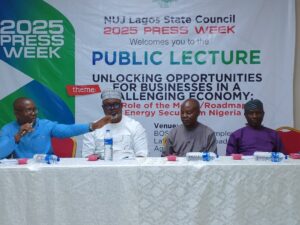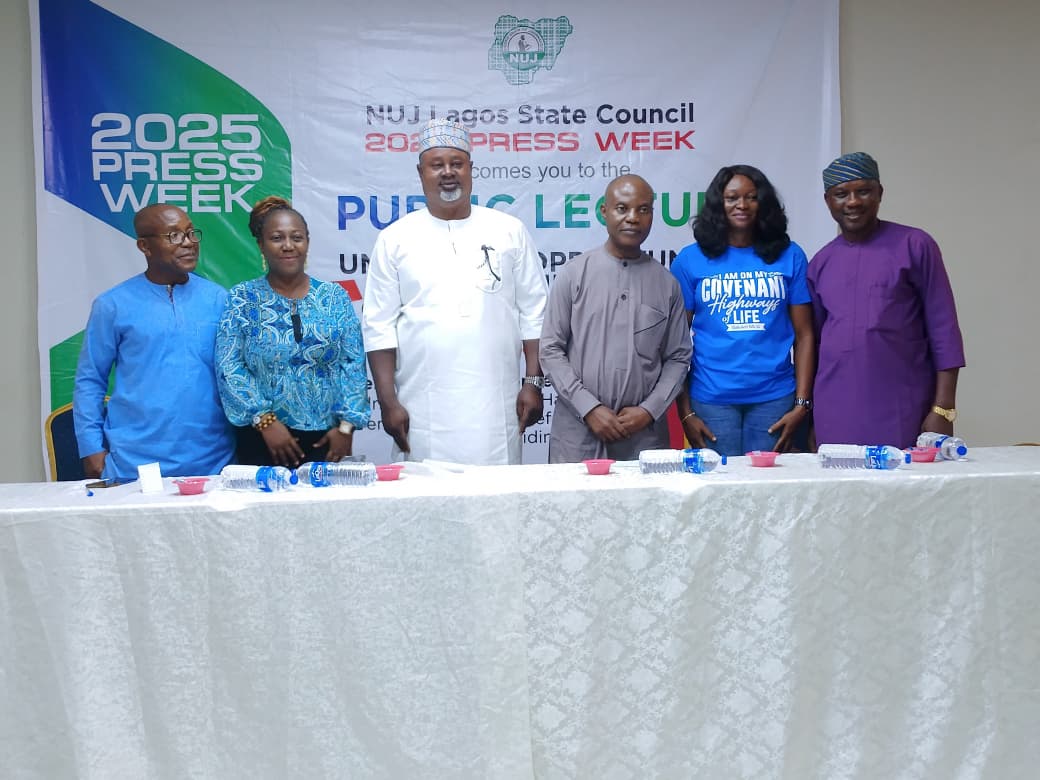Nigeria’s energy transition, business climate and the evolving duty of the media took centre stage as the Lagos State Council of the Nigeria Union of Journalists continued its yearly Press Week with an engaging lecture and panel discussion focused on national development.
Impressively, the weeklong celebration began on Monday and remains dedicated to strengthening dialogue between the press, policymakers and industry stakeholders.

NUJ LAGOS COUNCIL PRESS WEEK 2025
Watch Also:MARKETING EDGE ONTV WITH BLESSING-KAYODE
Consequently, with this year’s theme focusing on business opportunities in a difficult economy and the road to energy security, speakers reiterated that newsrooms must remain central to public awareness and national accountability.
On this note, Adeleye Ajayi, Chairman, NUJ Lagos Council, explained that the focus mirrors the expanding responsibilities of journalists as the country seeks a stable energy framework and a stronger economic direction.
Again,he noted that the Press Week provides an opportunity to build clearer understanding around critical sectors, improve institutional transparency and enhance public engagement.
Media’s Duty in Nigeria’s Energy Transition
Meanwhile, the lecture session examined how journalists can hold public agencies responsible for delivering on energy reforms while also helping citizens interpret policies shaping the nation’s energy future.
Watch Also:MARKETING EDGE ONTV WITH BLESSING-KAYODE
However, stakeholders emphasised that deeper collaboration between media organisations, private operators and government agencies is essential to fast-tracking energy security in Nigeria.
Dangote Refinery and the New Energy Outlook
In a similar vein, Keynote speaker Esan Sunday, Senior General Manager for Corporate Communications at Dangote, delivered an extensive review of the refinery’s role in transforming the economy and easing long standing fuel challenges.
Therefore, he highlighted its contributions to job creation, foreign exchange savings and the sharp drop in fuel importation between 2024 and 2025.
Besides this, he explained that the refinery’s ability to pay for crude in naira has helped reduce pressure on the foreign exchange market and strengthened stability across related sectors.
While described the refinery as a massive national undertaking with a land mass comparable to an entire city, he emphasised its importance in stabilising supply, improving product quality and supporting long term economic aspirations.
Moreover, he urged journalists to keep educating the public on the real factors influencing fuel pricing and the broader economic context behind fluctuating pump costs.
In addition, he also encouraged the union to maintain principled editorial positions on national issues, adding that such positions reinforce public trust without compromising the independence of individual reporters.
Filling the Knowledge Gap in Energy Reporting
A panel session followed the lecture featuring Esan Sunday, Senior General Manager, Corporate Communications, Dangote, Udeme Akpan, Energy Editor, Vanguard Newspapers, Sylva Okereke, Publisher, Sylva News, and Adeleye Ajayi, Chairman, NUJ Lagos Council.
Again, the discussion explored the widening knowledge gap between the media and the public, the need for improved industry reporting and the role of journalists in shaping clearer narratives around national development.
Media Must Simplify Energy Conversations
On another hand, Udeme Akpan, Energy Editor, Vanguard Newspapers, stressed that journalists must break down complex energy issues into simple, relatable language for citizens who rely on the press for clarity.
He emphasised that the transition to cleaner fuels, crude-for-naira arrangements, gas adoption and refinery output must be covered with consistency and depth, not as episodic stories tied to shortages or price spikes.
Also Watch:MARKETING EDGE ONTV WITH ADEYINKA AGUNLOYE
He warned that without sustained analysis of energy policies, “citizens cannot fully appreciate what is changing, why it is changing and how it affects their livelihoods.”
He called on newsrooms to invest in sector training, data literacy and partnerships with experts so reporters can better interpret pricing templates, forex movements, refining capacity and supply chain restructuring.
Energy Reporting Must Hold Institutions Accountable
Sylva Okereke, Publisher of Sylva News, expanded the accountability conversation with a structured model he called I I S K, representing four critical duties of journalists:
-
Investigating
He noted that detailed investigations remain one of the strongest tools for holding government accountable. By interrogating data, budgets and project outcomes, journalists expose corruption, lapses and mismanagement that often stay hidden without media scrutiny.
-
Information
Okereke stressed that proper dissemination of accurate information arms the public with knowledge that compels government agencies to act. When citizens understand what is expected of an institution, they can demand performance, placing pressure on policymakers.
-
Specialisation
He urged reporters to specialise in sectors such as petroleum, gas, power and renewables. Specialised knowledge, he said, helps journalists detect discrepancies in projects, timelines, contracts and regulatory decisions.
-
Agenda Setting
The final component is agenda setting, which involves giving the public and institutions a clear yearly direction on issues that deserve national attention. By tracking commitments over time, journalists remind agencies of promises made and compel continued transparency.
Okereke noted that accountability in energy reporting demands consistency and courage. He encouraged journalists to identify performance gaps, spotlight ignored communities and highlight innovations within the gas value chain, renewable energy and off grid power solutions.
Esan Sunday’s Additional Reflections During the Panel
During the panel, Esan returned to his message on understanding the media. He said many professionals attempt to engage the press without understanding its purpose or intellectual process.
“You cannot benefit from what you do not understand,” he repeated.
Watch Also:Insights from National Advertising Conference 2025
He recounted experiences in Berlin and Nigeria where journalists were treated as afterthoughts, including a bank commissioning event where reporters were restricted. He explained that such treatment reflects a deep misunderstanding of the media’s oversight role.
Esan encouraged practitioners to remain courageous, ask purposeful questions and continually deepen their understanding of national issues. He added that Nigeria can only solve its internal and external challenges when citizens grasp the purpose of information, the responsibility attached to truth and the independent role journalism plays in a democratic society.
Beyond the Conversations
The Press Week opened with a health walk and wellness activities earlier in the week. More events are scheduled, including the Media Rendezvous, an evening of cultural expression and professional bonding for journalists across various chapels.
The Lagos Council’s 2025 Press Week continues to serve as a rallying point for strengthening professional values, elevating reportage quality and advancing public understanding of Nigeria’s energy future and national development priorities.
ALSO WATCH:MARKETING EDGE EDGE AWARDS 2025






Comment
No comments found.